
Usapa nâ!
As far as eating goes, words are the last thing you should put into your mouth. It’s okay for them to leave said orifice, but for them to find their way back — well, maybe you shouldn’t have opened your cakehole too soon. Now open up and say “Ahhh!”
Visayans have a lot of expressions involving food and eating, a fair share of them put-downs. Here’s a sampling. Use them, if ever, with a dose of caution. They’re better savored than swallowed.

Bawod na lang kuwang, dagat na
If a Bisaya says that your soup is “a wave short of the sea/ocean,” know better than to take offense. He is actually being kind, I kid you not, considering you just maxed out his weekly salt allowance with a single unfortunate sip of that brining solution you have the nerve to call soup. Far be it for me to play nice, though: I’m proudly Bisaya, but not the forgiving sort. I will not break it to you gently and I don’t care if my gills are showing.

Utok bolináw
The anchovy gets no respect. At least the flea had it coming for being the filthy bloodsucker that it is. But what has the anchovy ever done to you? It graced your table and filled your stomach — and for that it gets the dubious distinction of having its tiny brain associated with a stupid individual. “Brain of an anchovy,” indeed. Never mind if the bolináw’s teeny brain is proportional to its teeny size, but why let that teeny detail get in the way of a good put-down?

Mat-an pa sa pinja
I’m a bit intrigued by this phrase. A person who “has more eyes than a pineapple” is shrewd and savvy — the idiomatic “nobody’s fool.” On the other hand, there’s the terse “mat-an” (having many eyes) which describes someone who is street-smart and thus someone to be wary of. It’s obvious the two are cut from the same cloth (plucked from the same patch?), but are they, in fact, one and the same? Anyone in the mood to split hairs?

Lukdo ug kalabasa
A student “carrying a squash on his/her head” is variously referred to as a repeat performer, a balik-torian, or simply as Teacher’s Pet — because said teacher misses that student’s company too much to let him/her advance to the next grade level. That student is either monumentally stupid (not to cheat) or incredibly honest (to cheat). I'm dying to ask, though: Does the kalabasa come with bagoong? (And don’t monkeys prefer bananas?)
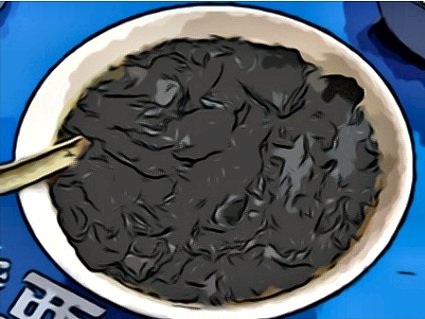
Kaon ug uling
“Dear Husband: Please send us money — more than what you sent last time, because food prices have gone up again and soon we may have to start eating charcoal to get by, though that, too, gets costlier by the day, not to mention it tastes godawful and isn’t proper brain food and surely you don’t want Junior carrying a squash on his head instead of graduating and then I’ll die of shame, not the hunger. Take care, God bless, and your pare says hi. — Your loving wife, XXX.”
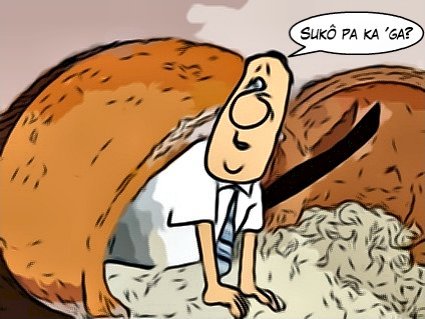
Jabo ang kaldero
“(To) have one’s pot upturned” is to lose one’s means of income. Bad, huh? Here’s more: the subtext is that the newly jobless is the family’s sole breadwinner. Now that, my friend, is a lot of trouble to be in. It’s especially tough if such person is male, because we all know that man doesn’t live by bread (or charcoal) alone. As a married female friend eloquently states her case: “No money-down, no panty-down!” Wow, aren’t you glad you’re single? Wait — you’re not?
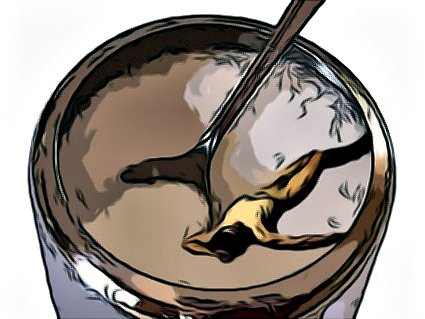
Mamatay ibabaw sa kamay
“(To) die on top of sugar” is a euphemism — or is it dysphemism? — for dying while in the act of copulation. Yes, that guy is supposed to be dead, not sleeping. In fact, that’s Prince Hector (of Troy fame) from Jacques-Louis David’s Hector’s Corpse (1778). And just in case you were wondering, Hector did not die on top of sugar; he was killed in battle by Achilles. What — you don’t know who Achilles is, too? Then surely you know how to balance a squash on your noggin?
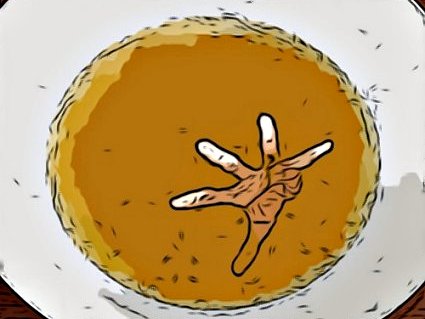
Nalumos sa sabaw
Here’s an expression I don’t quite get. Why is an absentee father said to have “drowned in soup”? I understand that replacing “soup” with “sea/river/tub” would make the phrase sound too literal as to be unfunny, but why is it always the male parent who drowns, worthless though he may be? And on a related note, why is it that when people ask after someone’s absentee mother, the reply is almost invariably, “Tua sa Japan!”?
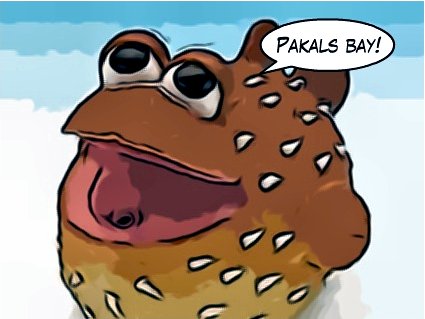
Butete ka’ng dakô
Did someone mention “Japan”? Butete (pufferfish) is big in Japan and people actually pay top-dollar to flirt with death eating fugu. Those Japs are really something. Wasn’t it only a year ago that thousands of them got conned into buying “poodles” that turned out to be sheep? You know what a Bisaya would tell a scammer? “Beh, you don’t fool me! I’ve got more eyes than a pineapple and you’re one big stinkin’ pufferfish!” That should deflate the bastard.
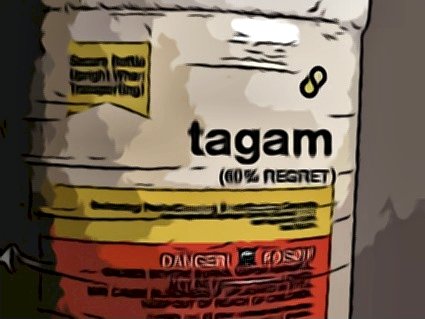
Kaon ug tagam
I regret to say that I couldn’t come up with a better translation of this phrase aside from “(to) eat regret.” There isn’t a word in English that adequately covers the territory of tagam, although regret comprises a great deal of it. Let’s just say that if you were to survive a case of butete poisoning, you’d regret it enough to avoid that fish at all costs. Hey, that’s it! Regret + resolve — that’s the very essence of tagam!
Usapa nâ! Mouth: Some Velvet Mornings; Alphabet: imaginacion_
Bawod na lang kuwang, dagat na Sheriff: Hoyboys; Soup bowl: Wikimedia; Surfer: Island Sports Shop
Utok bolináw Brain: Simpsons Trivia; Anchovy: Dries Buytaert
Mat-an pa sa pinja Pineapple: Experiencing Rheumatoid Arthritis
Lukdo ug kalabasa Squash: Lewanda Lim; Chimp: J.A.C.K.
Kaon ug uling Soup bowl: Like A Local; Charcoal: The Wey Valley
Jabo ang kaldero Clay pot: Far East Trade; Bald guy: Clipart Of
Mamatay ibabaw sa kamay Sugar: eHow; Hector’s Corpse by Jacques-Louis David: Beloit College
Nalumos sa sabaw Broth: The Tasty Island; Hand: Fish Or Cut Bait
Butete ka’ng dakô Pufferfish: Your Aquarium Center
Kaon ug tagam Acid: Mrtee’s Teatime Chemistry
This post has no comments.
Post a Comment